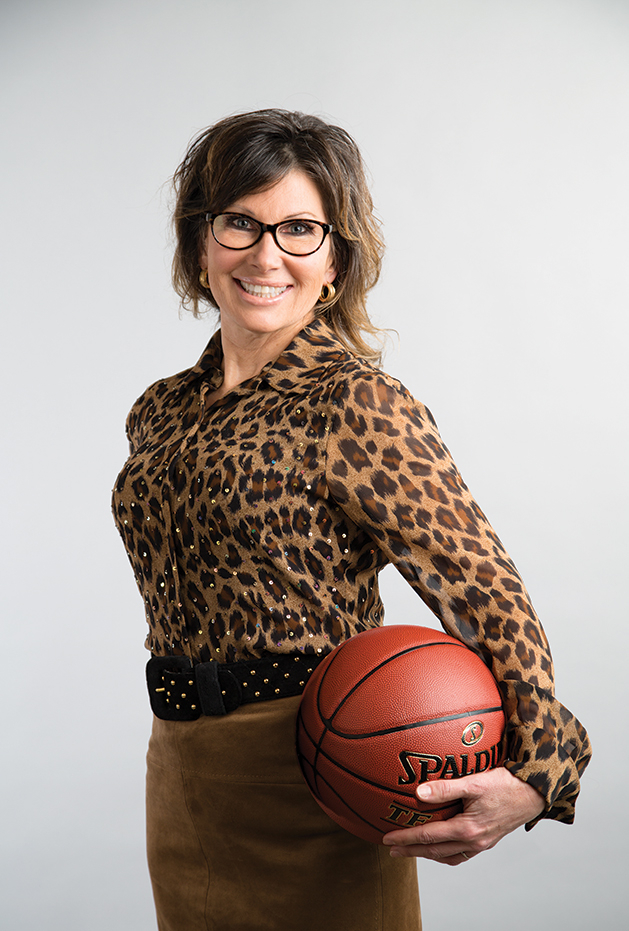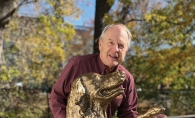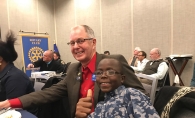
Giovanna Ingram discovered her love for the game of basketball in her hometown of Hollywood, Calif. with a group of neighborhood kids and a cheaply made hoop. “Growing up in Hollywood, we did not have organized sports,” Ingram says. “So kids started games in the neighborhood.” Despite the lack of organized sports, Ingram fell in love with the fast paced nature of basketball, the feeling of weightlessness as she flew toward the basket. As she grew up, Ingram continued to play at recess, and finally made the high school team. And although she did not join a team in college, the game has continued to play an important role in her life.
A move to Edina and two kids later, Ingram is now the president of the Edina Basketball Association—the fourth female president in the association’s almost 40-year history. “I have two boys and both of them went through the Edina Basketball program,” she says. Eight years ago, Ingram joined the parent-run board of the association, starting right off the bat with two roles—treasurer, and sponsorship and fundraising director—both jobs no one else wanted to take on. Over her eight-year legacy with the organization, Ingram has held almost every other position. “I was on the board for so long, the stars and the moon kind of aligned and I was next in line to be president,” she says.
In her two-year term as president, Ingram hopes to recruit more kids for the program and introduce more community members to a sport that has been central to her life. Ingram believes that basketball is an intuitive sport for kids, and one that teaches leadership, hard work and fosters friendship. When Ingram first began playing herself, “I loved the quickness of it,” she says. “I loved the fact that everybody who played was able to touch the ball, I liked the people flying in the air.” Ingram also hopes to aim her focus on recruiting more girls to play in the program—which runs from kindergarten through 12th grade. “The goals are to increase our attendance—especially on the girls side,” she says. “But we also welcome more boys—that’s for sure!”
Ingram hopes to squash the stereotype that basketball is mostly a sport for boys. “It’s a game for both boys and girls,” she says. Ingram believes the sport of basketball is intuitive for kids of both genders. “A little kid can just throw the ball up into the hoop with almost no direction,” she says, going on to explain that basketball is one of the only sports that kids can pick up based solely on intuition.
But, for Ingram, the game of basketball goes much farther then throwing a ball into a hoop. “It’s fast paced; it’s a sport that’s easy to learn,” she says. “The other nice thing is you’re learning to take direction from a teacher who is taking the time to train you. You learn the really good skill of winning, but also how to lose with your head held high, go back to the table and figure out how to win. So many times people think it’s just an activity.”
The Edina Basketball Association is also a big advocate for inclusion. One of the goals that many parents and kids who participate in the program have is to make their high school team, but for kids that get cut from school teams, the Edina Basketball Association offers a chance for all athletes to keep playing through their high school years. “The program is a safe place for kids to play,” Ingram says. “We try to stay competitive but also try to make it fun. We also try to make sure every kid can play. We start ’em young and take ’em all the way up!”
Ingram has seen her own two boys grow along with the program, her oldest son (now 19) went on to play for Edina High School and her younger son (now in eighth grade) recently made the Edina Basketball traveling team. “Edina Basketball has made a huge impact on my kid’s lives,” she says.
Ingram feels confident in her new role. “People had confidence in me,” she says of her fellow board members, “knowing the history of things as a longtime board member.” But she also notes that she will not be going it alone—she will have an entire board of parent volunteers backing her up. “I just can’t stress enough that how the volunteers devote hours to the association,” she says. “Meeting after meeting, survey after survey—trying to make sure the program is always improving.” The association is made up entirely of parent volunteers and one paid administrator, and Ingram hopes to recruit more parents for the board as well, a job that she feels grateful to have been a part of for the past eight years.
In her position as president, Ingram hopes to be a listening ear for the kids and families in the program who may choose to not be a part of the board. “My goal is to be an advocate for families, a voice for people who have suggestions in the community,” Ingram says, adding that although many families want different things out of the program, the kids will all leave with the same central skills. “Some families want their kids to get [Division I college] scholarships, some just want them to be able to play in the moment and my goal is that no matter what they are trying to get out of the association, they have learned leadership skills, made new friends and been able to deal with the ups and downs of winning and losing.”









